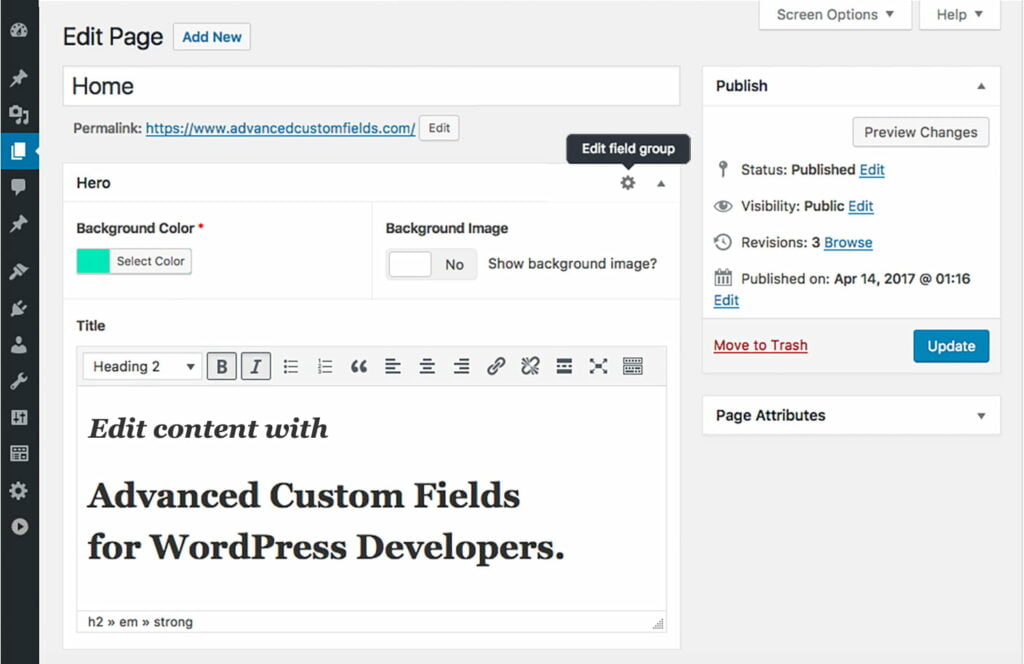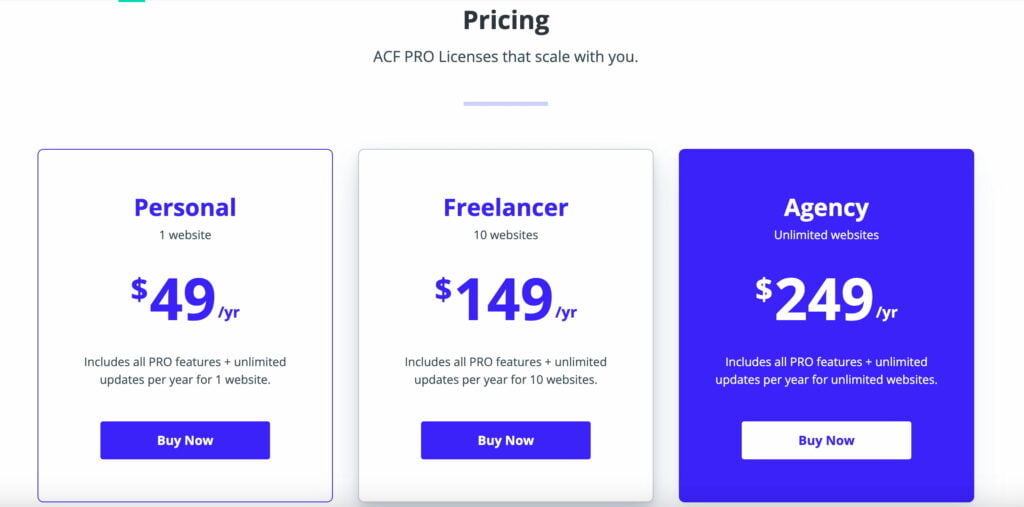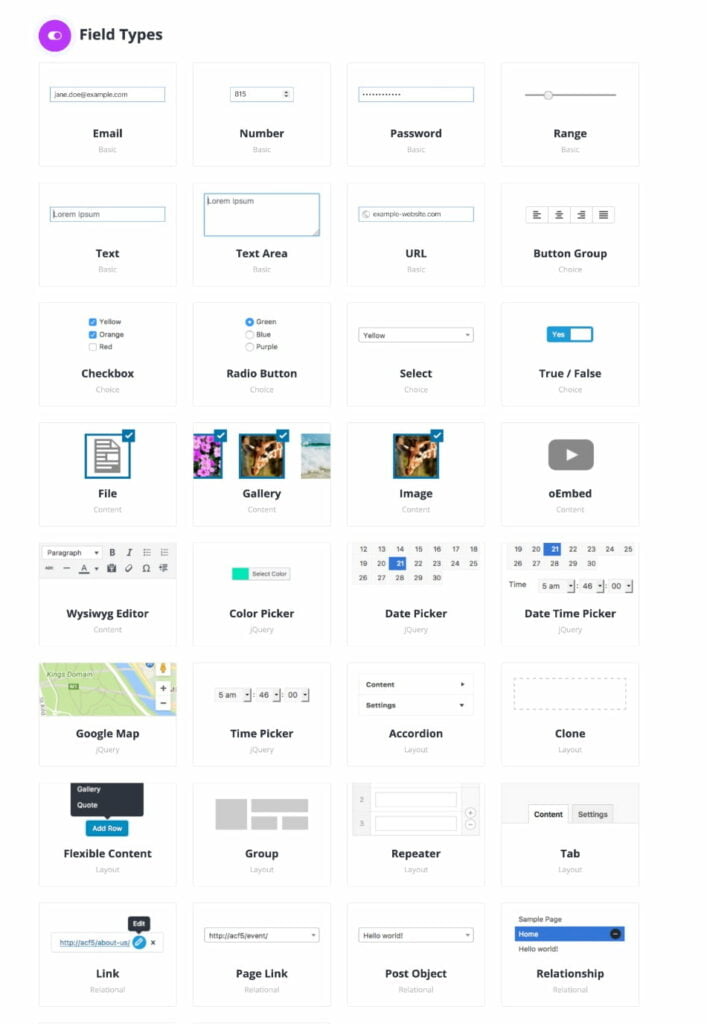What is ACF in WordPress?
Table of Contents
Content creators enjoy working with WordPress because of its flexibility and the possibility of adding the needed elements and functionality to enhance their work. Writers often wish to use more than the default WordPressWordPressOpen-source content management system (CMS) that allows users to create and manage websites and blogs.
More About WordPress settings offer. Creating custom post types and working with custom post fields gets possible, thanks to the availability of plugins like ACFACFAdvanced Custom Fields is a WordPress plugin designed to simplify adding and managing custom fields within WordPress.
More About ACF. This article focuses on discovering “What is ACF?” and how you can benefit from using it in your work.
What is ACF?
Advanced Custom Fields, or ACF, is a powerful WordPress pluginPluginA piece of software that can be easily installed and activated on a CMS platform to enhance its capabilities.
More About Plugin that enables designers and developers to deliver websites with advanced and user-friendly features to their clients. The plugin takes the core feature of WordPress, the custom field system, to the next level by providing a comprehensive range of standardized fields, each with unique capabilities.

ACF allows designers and developers to create custom fields that can store and display various types of content, such as text, images, videos, and more. With ACF, managing and organizing data within WordPress becomes easier, making it simpler to create dynamic and engaging websites that meet clients’ needs.
One of the key advantages of ACF is that it allows users to create repeatable field groups, which can be easily duplicated across different pages and posts. This saves time and ensures consistency in design and functionality across the entire website.
Advanced Custom Fields (ACF) is a powerful tool that enhances the process of entering meta data into the WordPress databaseDatabaseAn organized collection of data, typically stored electronically.
More About Database. It provides the ability to control and standardize the data as it is stored, resulting in a cleaner and more organized database.
Moreover, ACF offers a seamless way to display the meta data on the front endFront EndThe visible interface visitors engage with upon visiting a website constitutes its front end.
More About Front End of the website. It ensures that the data is visually appealing and stable, contributing to an enhanced user experience.
In addition to these features, ACF also supports custom options pages, front-end forms, and custom Gutenberg blocks. This makes it an extremely versatile tool that can be used for a wide range of WordPress projects.
ACF Free vs ACF Pro
There are two versions of this tool available, a free version and a pro version, with various pricing tiers depending on the number of sites you plan to use it on. The free version offers great flexibility and has all the basic features needed to create fantastic websites. However, if you upgrade to the ACF pro version, you will gain access to additional features essential for modern professionals.
- The Repeater Field allows you to create sets of sub-fields that can be repeated unlimited times. This feature is particularly useful for managing complex data structures and streamlining your workflow.
- ACF Block Support enables you to register custom GutenbergGutenbergA block-based editor for WordPress.
More About Gutenberg blocks that utilize ACF fields to control data. With this feature, you can easily create and manage custom blocks that fit seamlessly into your website’s design and functionality. - The Flexible Content Field is another powerful feature that allows you to create flexible layout templates using groups of sub-fields. This feature is perfect for building complex page layouts and customizing your website’s design to your specifications.
- Options Pages is a feature that allows you to set up custom site options, giving you more control over your website’s settings and functionality.
- The Gallery Field is a great tool for managing sets or collections of images. With this feature, you can easily organize and display your images in an attractive and user-friendly way.
- The Clone Field allows you to reuse fields and field groups without recreating them every time. This feature can save you time and effort when managing multiple websites or building complex data structures.

Custom Fields for WordPress
ACF offers a range of user-friendly input fields that can be easily configured within the WordPress admin. These fields can be organized into groups and displayed in various areas of the WordPress backend. With ACF fields in place, website administrators can easily interact with them, making it straightforward for people creating posts, taxonomy terms, users, and other website content to understand what information needs to be added. This intuitive system simplifies managing and updating a website, saving time and effort for everyone involved.

ACF’s core offers a diverse range of 30 custom field types, with an ever-expanding number of third-party fields developed by independent developers worldwide. The ACF core includes a range of field types, including single and multi-line text fields, WYSIWYG text editorEditorThe interface that allows you to write and format text, add images, embed media, and much more.
More About Editor fields, select, multi-select, and true/false fields, as well as checkboxes and radio group fields.
Additionally, ACF also offers a Google Maps field, file upload, image, gallery fields, time, date, color picker fields, and post-relationship fields. With the oEmbed field, you can embed content from various supported platforms. And for organizing fields in the WordPress admin, ACF provides accordion and tab fields, making it easier to manage and update website content. With such a vast array of custom field types, ACF offers unparalleled flexibility and functionality to website administrators, saving time and streamlining workflow.
Who is ACF Built for?
If you’re a developer, ACF can help you normalize metadata for various objects, including post objects, taxonomy term objects, user objects, and more. You also get a set of templateTemplateA website template is a pre-designed webpage that is a starting point for creating a website.
More About Template functions with a stable APIAPIApplication Programming Interface serves as a bridge that enables different software systems to communicate and interact with each other.
More About API for displaying and updating metadata.
For designers, ACF offers an opportunity to expand technical boundaries and go beyond standard WordPress templates to create complex layouts with structured data and advanced templates. Working primarily within front-end languages, designers can structure, format, and display data with minimal PHPPHPHypertext Preprocessor is a programming language primarily used for web development.
More About PHP while delivering websites that meet their clients’ needs. With ACF, designers and developers can take their skills to the next level, offering robust, user-friendly websites that enhance the user experience.
What is ACF Used for?
With ACF, there are virtually no limits to what we can build. Whether we’re creating simple brochure-style sites or complex data systems, ACF provides the foundation we need to build any website or web applicationApplicationA software program designed to perform specific functions or tasks on electronic devices, such as smartphones and tablets, computers, and smart TVs.
More About Application in WordPress. Here are just a few examples of projects I’ve been involved in:
- Sports results platforms allow site admins to add data while front-end users can view and filter results.
- Complex product listing sites using ACF and WooCommerce display heavily customised product experiences.
- Real estate listing sites that support listing, searching, and displaying properties for multiple estate agents.
- Yoga studio sites that list classes and manage student attendance.
- Date aggregating sites that consume data from third-party systems, save it into WordPress via ACF, and provide various ways of visualising that data.
What’s more, some developers even bundle ACF into their plugins to provide a high-quality user experience for settings without the effort of coding out the admin side of things. With advanced custom fields, the possibilities are endless, and the tools are in place to create websites and web applications that exceed expectations.
ACF Forms
ACF forms are useful for developers to display front-end forms made up of ACF fields. This allows users to create or edit posts on a website and can be used on any post type, opening up possibilities for user-generated content. With some customization, developers can even set up a custom admin dashboard to restrict access to certain users.
The ACF Forms documentationDocumentationThe process of creating, organizing, and maintaining written materials that provide information about a web project.
More About Documentation provides options for controlling ACF Forms and includes code snippets for easier implementation.
For those who need more control and advanced features, the Advanced Forms Pro plugin developed by Fabian Lindfors and offered by Hookturn can be useful. It allows the creation and editing of users in addition to posts and includes hooks and filters for customization and integrations with MailChimpMailChimpA popular email marketing and marketing automation platform.
More About MailChimp, Zapier, and SlackSlackMessaging and collaboration platform designed to streamline communication and enhance productivity within teams and organizations.
More About Slack. It is recommended to check out the plugin documentation and try the free version before committing to the pro version.
ACF Options Pages
ACF offers support for creating nestable custom options pages, which allows developers to create top-level options areas in the WordPress dashboard with any number of sub-pages. Developers can assign advanced custom fields field groups to these options pages with any combination of fields for site administrators to manage, providing a way to easily and quickly create custom options for the entire site or default options to fall back on when a post, page, user, term, or other content is missing data. Advanced custom fields also supports using the data from an ACF options page to populate available options in other fields.
When ACF fields are loaded on an options page, the data is stored in the wp_options database table, which can help reduce the size of meta tables on a site. To query the data, developers need to pass either “option” or “options” to the get_field() and the_field() functions so that ACF knows the field name being requested is for an options field.
Creating options pages requires using PHP code, and the advanced custom fields documentation provides useful snippets for the acf_add_options_page() and acf_add_options_sub_page() functions. For a shortcut, developers can use ACF Theme Code Pro, which generates the necessary snippets for pasting into a theme’s functions.php file.
ACF Blocks
ACF’s latest addition to their feature set is the inclusion of support for the WordPress Block Editor (also known as Gutenberg). This new feature is rapidly evolving, and it enables developers to conveniently register custom block types and utilize PHP to construct the necessary templates for rendering the blocks. By assigning advanced custom fields field groups to custom blocks, developers can make fields accessible to users as they create posts within WordPress.
The capability to swiftly generate custom blocks for the new block editor is a valuable asset, enabling developers to move away from solutions based on Flexi Field and instead provide more visually appealing and user-friendly admin experiences for content creators. The admin preview updates in real-time as the fields are updated, making it easier to visualize the impact of the data on the public-facing website.
FAQ
- Is coding knowledge required to use ACF?
Yes, to some extent. You should have a basic understanding of HTMLHTMLThe fundamental language used to create and structure content on web pages.
More About HTML, CSSCSSCascading Style Sheets is a coding language that determines the appearance and layout of a website.
More About CSS, and PHP in the context of WordPress themeWordPress ThemeA collection of files that determines a website’s overall design and functionality.
More About WordPress Theme templates and development. ACF documentation offers a brief guide on displaying values in your theme, and each field type’s documentation provides additional examples of how to display various fields.- Are there any shortcuts for managing ACF template code?
If you’re comfortable working with snippets or want to save time, you can leverage ACF Theme Code Pro, a plugin available through Hookturn. It generates the PHP code needed to render your ACF fields. Copy and paste the generated code into a template, and add HTML. A free version of ACF Theme Code is also available on the WordPress.org plugins repository if you’re using the free version of ACF.
- Can ACF be extended?
Yes. The website has an entire library of extensions filled with plugins that extend the ACF core. Some extensions add new features, others enhance existing ones, and some add new field types to help you expand your field groups.



